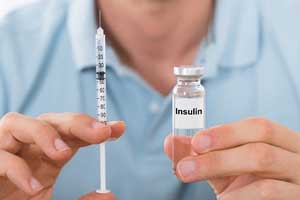- Home
- Editorial
- News
- Practice Guidelines
- Anesthesiology Guidelines
- Cancer Guidelines
- Cardiac Sciences Guidelines
- Critical Care Guidelines
- Dentistry Guidelines
- Dermatology Guidelines
- Diabetes and Endo Guidelines
- Diagnostics Guidelines
- ENT Guidelines
- Featured Practice Guidelines
- Gastroenterology Guidelines
- Geriatrics Guidelines
- Medicine Guidelines
- Nephrology Guidelines
- Neurosciences Guidelines
- Obs and Gynae Guidelines
- Ophthalmology Guidelines
- Orthopaedics Guidelines
- Paediatrics Guidelines
- Psychiatry Guidelines
- Pulmonology Guidelines
- Radiology Guidelines
- Surgery Guidelines
- Urology Guidelines
Human insulin as effective as costlier insulin analogs in diabetes

"We found that for patients with T2D in usual practice, the use of the more expensive insulin analogs did not appear to result in better safety -- at least as defined by hospital or emergency visits for hypoglycemia -- or better blood sugar control compared with NPH insulin," Lipska added. "This suggests that many people with type 2 diabetes should consider starting with NPH insulin, instead of insulin analogs, especially if cost is an issue for them."
"For decades, people initiating insulin treatment were prescribed human insulin," said Andrew J. Karter, senior research scientist with the Kaiser Permanente Division of Research. "Then in the 2000s, a new generation of long-acting insulin analogs emerged that were designed to mimic human insulin."
"The problem is that insulin analogs are much more expensive than human NPH insulin," said Lipska. A vial of insulin analog now costs about $200 to $300, while a vial of NPH insulin costs just $25. Dr. Karter's research has shown that high out-of-pocket cost of medications, especially at the time of initiation, are linked to poorer adherence, which directly affects outcomes for diabetes patients."
"The cost differential between analog and NPH insulins is huge, up to a 10-fold difference," Karter said. "Some people with type 2 diabetes may find the potential benefits of insulin analogs worth the additional cost. But we found no population-level evidence to suggest that the extra expenditure is warranted for most people with type 2 diabetes, particularly when the high cost could prevent some of them from getting the treatment they need or divert resources away from other, potentially beneficial clinical interventions."
For more information click on the link: http://dx.doi.org/10.1001/jama.2018.7993

Disclaimer: This site is primarily intended for healthcare professionals. Any content/information on this website does not replace the advice of medical and/or health professionals and should not be construed as medical/diagnostic advice/endorsement or prescription. Use of this site is subject to our terms of use, privacy policy, advertisement policy. © 2020 Minerva Medical Treatment Pvt Ltd